
Grant Funding for the Music Room
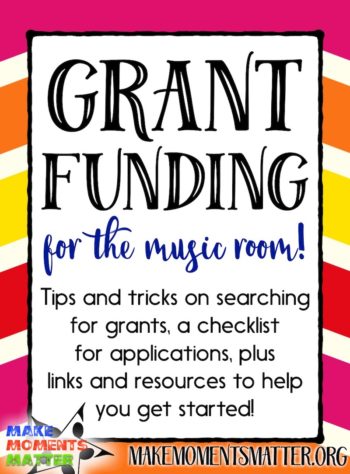 Do you ever look into a music vendor catalog and see pipe dreams instead of possibilities? These days I feel like it is a constant battle to get funding for the instruments, resources, technology, and professional development that we all desperately need. Even if you teach in an affluent district where money flows like water, I’m sure you still have projects and resources that just can’t seem to find funding. The truth is that funding for resources and experiences is out there if you know where to look.
Do you ever look into a music vendor catalog and see pipe dreams instead of possibilities? These days I feel like it is a constant battle to get funding for the instruments, resources, technology, and professional development that we all desperately need. Even if you teach in an affluent district where money flows like water, I’m sure you still have projects and resources that just can’t seem to find funding. The truth is that funding for resources and experiences is out there if you know where to look.Over the past few years I’ve given presentations at state music education conferences on grant funding and crowdsourcing for the music room. To try and cram all the information from those sessions into a blog post would be totally crazy. Instead I’m going to try and slim down the presentations and divide them into two separate blog posts. This blog post will feature information about grant funding, how to search for the right grant for you, and tips for writing grants. The next blog post will feature information about crowdsourcing, DonorsChoose.org, and lots of tricks and details that I’ve learned along the way. If I forget to say something or bring up a topic you’d like to discuss further feel free to ask me about it in the comment section below or by email – MakeMomentsMatter@gmail.com.
What is a grant?
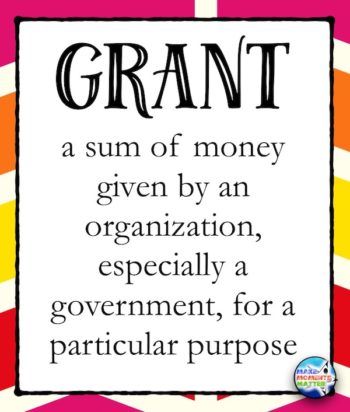 Let’s be clear about what a grant is and is not. Grants are special gifts of money to fund a certain project or purpose. With a grant, the money does not need to be paid back to the lender and generally grants have very few strings attached. Often grant money comes from the government, but not exclusively. Many community organizations and foundations give out grants as well, just not with the same frequency or high dollar amount that the government does. The only caveat with this type of gift is that grant money MUST be used for a specific purpose. For example, if you ask for money for an acoustic piano in your grant application and the grant is funded, then the money cannot instead be used for an electric piano. The money has to be used for the specific purpose laid out in the terms of the grant proposal.
Let’s be clear about what a grant is and is not. Grants are special gifts of money to fund a certain project or purpose. With a grant, the money does not need to be paid back to the lender and generally grants have very few strings attached. Often grant money comes from the government, but not exclusively. Many community organizations and foundations give out grants as well, just not with the same frequency or high dollar amount that the government does. The only caveat with this type of gift is that grant money MUST be used for a specific purpose. For example, if you ask for money for an acoustic piano in your grant application and the grant is funded, then the money cannot instead be used for an electric piano. The money has to be used for the specific purpose laid out in the terms of the grant proposal.
Often with grant funding you have to write/compile what’s called a “grant proposal.” This means that you pull together all the information that the granting agency needs to know before they can give you money. Sometimes you are required to prepare a proposal essay, a budget, a list of references, etc. What you are required to submit depends on what the granting agency wants to know. You do all the work and submit your request (your “grant proposal) by the due date to be considered for the funding. In other instances (especially now that we’re a more digital society) you may just need to fill out a form online with all pertinent information instead of making a large grant proposal document. Again, it all depends on what the granting agency/foundation requires.
Start by Looking Locally
There are a lot of organizations that give out grant money in large, medium, and small amounts, you just need to know where to look. I think that it’s smart to start by looking locally and checking out the resources in your own backyard (because local groups are more likely to give locally and care about your cause!). Your first and best course of action is to ASK AROUND! Ask friends, colleagues, and other smart people in your area if they’ve heard of grants that might cater to your need. Send out emails to other music teachers and/or people in your specific area of teaching to see if they can help you find what you’re looking for. Then get online and see what else you can drum up. Use search terms like “Music Grant,” “Education Grant,” “Arts Grant,” and “Your City” or “Your State.”
Some helpful places to start looking are community foundations, local banks/credit unions, teachers associations, local Kodaly/Orff/String Teacher chapters, and more. You may need to really search around as sometimes local groups aren’t very good at maintaining their websites. This could mean digging a bit to find the right grant for your specific situation, but it’s worth looking. Again, this is a good time to ask teachers who live near you what they’ve done in the past. Often times your connections will help you find the grants that are right for you.
One helpful tip: don’t limit yourself to looking ONLY for music education specific grants. Use more general search terms like “education grant” and “your location.” Check out any/all grants that fund education projects. Sometimes you’ll have to slog through search results containing STEM, reading-specific, environment-preservation education, and other very specific non-music grants. But sometimes you’ll find a grant that is open to ANY education related project. Those general grants may just be the perfect fit for your project!
Take a Broader Look and Search Nationally
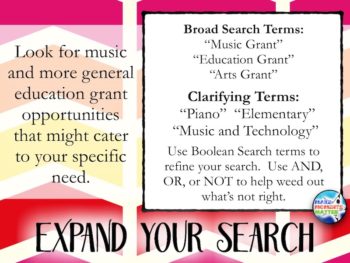 If you feel that you’ve exhausted all your options locally then start to take a broader look into the wide world of grants and funding. There are many organizations out there that fund education projects. This time search with terms like “Music Grant,” “Education Grant,” “Arts Grant” and instead of putting your specific geographical area in the search terms, put in details that limit and refine the sort of results you get. For instance I might put in “Music Grant AND ukulele” or “music grant AND instrument” to help bring up grants that are related to ukulele or instrument purchase. This limits the type of results you get and helps you find the pages and grants that actually pertain to you. If you don’t put those limits in there, you might be scrolling endlessly through 20,000 search results that really don’t apply to your situation.
If you feel that you’ve exhausted all your options locally then start to take a broader look into the wide world of grants and funding. There are many organizations out there that fund education projects. This time search with terms like “Music Grant,” “Education Grant,” “Arts Grant” and instead of putting your specific geographical area in the search terms, put in details that limit and refine the sort of results you get. For instance I might put in “Music Grant AND ukulele” or “music grant AND instrument” to help bring up grants that are related to ukulele or instrument purchase. This limits the type of results you get and helps you find the pages and grants that actually pertain to you. If you don’t put those limits in there, you might be scrolling endlessly through 20,000 search results that really don’t apply to your situation.
Use Boolean search terms to help limit what sort of results you get. Not sure what Boolean search terms are? They are those special words that limit or augment the results you get when you do a search on any search engine. They’re the words AND, BUT, OR, NOT, etc. that help refine your search. For a handy dandy little tutorial on Boolean search terms check out this webpage, it’s actually really fun!
Here again, don’t limit yourself ONLY to arts/music granting organizations. There definitely are some amazing musical organizations that awards grants like the VH1 Save the Music Foundation, Fender Music Foundation, BMI Foundation, Mr. Holland’s Opus Foundation, etc. However, there are a ton of granting agencies (foundations, organizations, charitable wings of major corporations) that are not music or even arts specific that can and will fund music projects. Sometimes these agencies come up in local searches or statewide education grant searches. Examples of this are Starbucks, Sony, BestBuy, ConocoPhillips, etc. What you see in the picture on the left is just a SMALL taste of what’s out there.
What in the world are these big corporations doing granting education funding? One great example is the Chevron corporation. Chevron routinely gives money to education in the states where it has oil interests, refineries, or distribution centers. Giving to education creates great press, a tax write-off, and goodwill among consumers. Win, win, win! Looking for corporations that might be willing to give to your classroom is worth the effort!
My fun example of an unrelated corporation giving to classrooms was when NASCAR funded a project at my school. I heard that the NASCAR Foundation (NASCAR’s charitable wing) was planning on flashfunding all DonorsChoose.org projects in the Kansas City metro area as long as they were technology related. NASCAR has a big racetrack in Kansas City and they were preparing for an upcoming race. My guess is that they wanted some free publicity before the race to drum up interest AND they probably also wanted to be able to share stories about their goodwill at the race itself. I mean, who wouldn’t smile at a picture of a NASCAR driver up on the big screen with a gaggle of kindergarteners huddled around him?
The NASCAR Foundation wanted to fund technology-based projects in education and I had a need for technology. I created a project that involved a video camera, hard drive, and iPod and NASCAR was more than happy to fund it! The coolest part is that a NASCAR driver actually came to my school, took pictures, and spoke at an assembly about the business behind NASCAR since he actually had his MBA and owned his own part of the franchise. Sadly he didn’t bring his cars… but he did show up in his NASCAR jumpsuit and really delighted the kids.
So, be on the lookout for education grants that come from large corporations. They have the money to give and are absolutely willing to do it because it creates great publicity for them and also works as a tax write off. Sometimes they’ll be specific about which projects they want to fund (e.g. STEAM, technology, character-based, performance, etc.) and sometimes the grant application will be open to any/all who want to apply.
General tips to Get those Grants Funded!
#1 – Follow all the Instructions
Grant applications are not confusing or vague. In fact, foundations/granting organizations are usually very clear about the details, information, and specific documents that they need in order to consider your application for funding. For instance, they might tell you that they need a short 400-600 word essay about the proposed project, a budget, an explanation of cost, a timeline for the project, etc. They will tell you what they want and need to know. MAKE SURE YOU PROVIDE WHAT THEY’RE ASKING FOR. Seriously, don’t submit an application that doesn’t’ include all the information they need.Let’s say, hypothetically, that an organization has 1,000 applications but only 50 grants to give this current year. If you submit an application that doesn’t explain or meet all their criteria, they’re probably not going to call or email you for follow up. With that many applications they just don’t have they time. If they aren’t given all the details that they need, they will probably just not even consider your grant application for funding. So…. make sure you give them all the information they need! Go through their checklist and be certain that you supply them with all the details they require.
Conversely, don’t give them too much information. If they didn’t ask for it but you think “Well, I could throw this amazing little cd of my kindergarteners in there just, you know, so that they get some more information about who we are and because kindergarteners are just so unbelievably cute!”… Resist the urge. Again, if they have 1,000 applications but only 50 grants to give this current year they don’t have time to go through the extra stuff. It’ll probably just get ignored or thrown away.
Take away: “Give them everything that they want, but not more…”
#2 KISS – Keep It Simple Student
When you’re writing for a grant application you want to keep your writing style more personal and less filled with music/education jargon, acronyms, and buzzwords. Simplify! Try and make your writing sound more like an email than like a page out of a technical report or journal. You’re not writing this for your administrator or the school board so you don’t have to fill the writing with buzzwords or special education words/phrases. For example, if I’m trying to get adaptive instruments (instruments designed specifically so that students with physical disabilities can still play) for one of my students this would probably NOT be the right way to get them:
“I’m asking for funding for adaptive instruments. When my students explore improvisatory exercises on the barred percussion instruments others play an ostinati or bordun. It’s often difficult for some learners with physical limitations to actively participate in the process and I want the setting to be inclusive. Sadly some students aren’t able to participate. We need the adaptive instruments so that students with specific special needs (as laid out in their IEPs and 504 plans) are able to participate in the least restrictive environment.”
This makes absolutely no sense to someone outside of education. Put it in plain English and think about your audience. Give all the details about what you need while also keeping the writing palatable. Use language that shows off the professional that you are (use technical language if appropriate), but don’t overdo it with the lingo. How about this:
“We use the barred percussion instruments (xylophones, glockenspiels, etc) a lot in the music classroom. We use these instruments for improvisation, singing games, accompaniment patterns, melodic practice, and so much more. However, I have several students with physical disabilities who aren’t able to sit down on the ground or wheel themselves up to the instrument. The instruments we currently have are top-of-the-line and so versatile, but sadly they’re hard for my students in wheelchairs to play. Adaptive instruments are special instruments made specifically for students with disabilities. These instruments come with stands, specialized mallets/sticks, and other adaptations so that anyone can play the instrument no matter their physical disability. I want my students to feel that they are part of the group and I don’t want the limitations of our instruments to stand in the way.”
Take away: “KISS: Keep It Simple Student”
#3 – Authenticity Counts!
It’s easy to forget that your grant proposal is going to be sitting in the hands of a human somewhere. Especially when you’re asking for money from big corporations, foundations, or national groups it’s easy to forget that humans will be handling the application. When you go on to the website for the Shell Oil Company to look for grants it’s easy to forget that even if you submit a grant application to the vast multi-national company that is Shell, you’re submitting it to a person at the organization not the organization itself. When working on a grant application budget or compiling your essay about the impact of the grant it’s possible to accidentally slip into technical mode. In trying to be persuasive and give all the facts it’s easy to lose sight of the personal interest in the grant itself.
So, don’t forget that the grant foundation board that will review your application is really just a group of normal people who come together to do their work. Write your application with the idea in mind that it’s going to sit in the hands of a real human being. I remember reading on the website of Chamber Music America that “All fundraising is personal fundraising.” It’s a good reminder as we work to make our proposal heard.
Make the proposal authentic.
Make the proposal personal.
Make the human connection.
Take away: “All fundraising is personal fundraising”
#4 – Be Persuasive!
This feels like a given, but when you’re in the process of writing a grant and have a checklist of things to gather, information to write down, and budget items to list, it’s easy to forget to be persuasive. Answer these questions: Why should you be funded? What makes your request compelling? What makes your project special and unique? Again, if there are 1,000 applications and only 50 grants, why should your application make the cut?
Take away: “Fight for your project. Be persuasive”
#5 – Answer All the Questions
When working on your grant application, try and answer all the important questions that need to be answered. Why should they give money to you? How will your project work? Where will the money go (who gets it and how is it used)? Who benefits from the money? Who benefits from the goods/services to be purchased? How are benefits measured? What value does this bring? If you answer all the questions the granting foundation/agency knows that you really have thought it through. You want them to think that you have a plan with concrete steps and you already know about the implementation of the grant money.
Example: You’re not saying, “Well, if you gave us $5,000 dollars that’d really be great and I know it would affect students.” You should instead be saying something like “The money from this grant would purchase a set of barred percussion instruments (i.e. xylophones, metallophones, and glockenspiels) and the GamePlan curriculum series. The barred percussion instruments are invaluable instruments that are easy for students on a daily basis to use and yet sturdy enough to last for years to come. The instruments can be used for all kinds of activities for students at all grade levels. GamePlan is a curriculum series which would provide lesson plan ideas, activities, and resources for all grades for the entire school year. The use of GamePlan would mean that all students would be singing, speaking, dancing, and playing as they work to understand improvisation, instrumental techniques, and ensemble skills. The series would work as a source for ideas and learning for the teacher, and the instruments would be used daily as all students in the school worked to incorporate them into their learning.”
Take away: “Answer all questions to let them know you have a plan”
LINKS and RESOURCES
I hope that this little tutorial about grants has helped to encourage and empower you when it comes to writing grants. Anyone and everyone can write a grant proposal and the more diligence you put into the writing, the better your chances at funding will be.
Aim big, shoot for the stars, and put your grant applications out there. I don’t know if your applications will be funded, but I do know that you will NOT be funded unless you put out a project/application and ask. I know that some of you still might be skeptical and think “Okay, that’s great, but I’m never going to get funded. 1,000 applications and I’m only one of those! No way!” I was that way for a while too, but I kept trying. You WON’T be funded if you don’t ask, right? So, I applied for VH1 Save the Music’s “Keys+Kids” grant last year and the proposal was funded!! My classroom received an amazing hybrid Yamaha digital piano, a “Soundpass” portable PA system and an amazing microphone to use with the setup. It has been a fantastic addition to our classroom learning and we NEVER would have had resources like this without the grant.


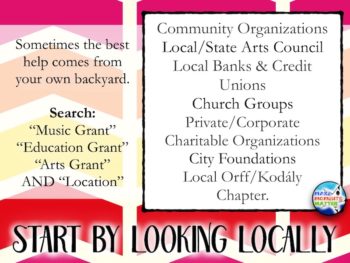
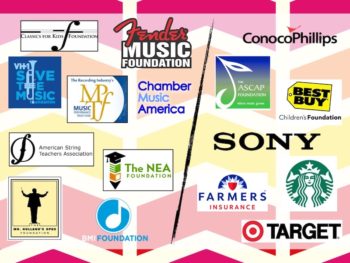
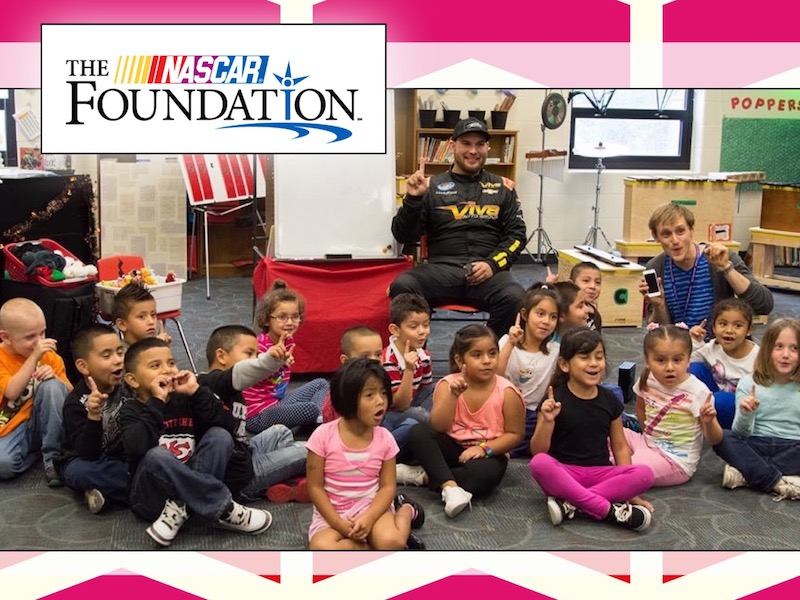
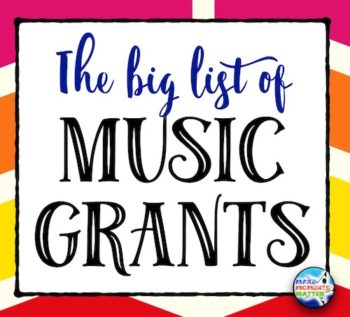
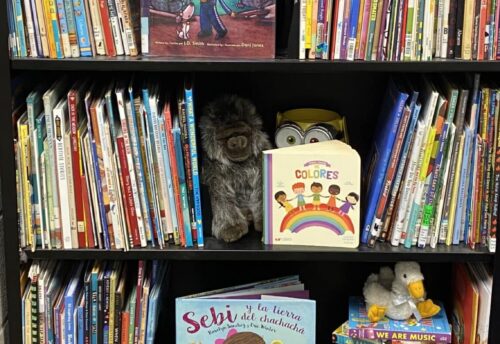
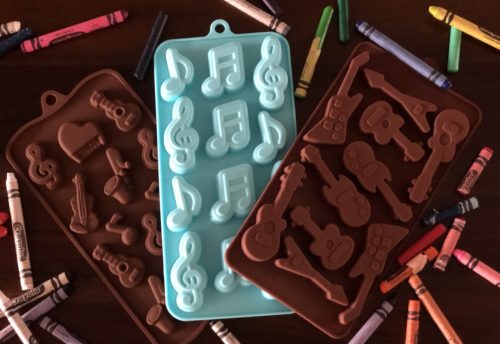
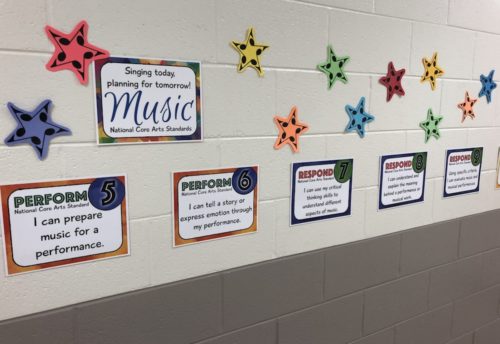
One Comment